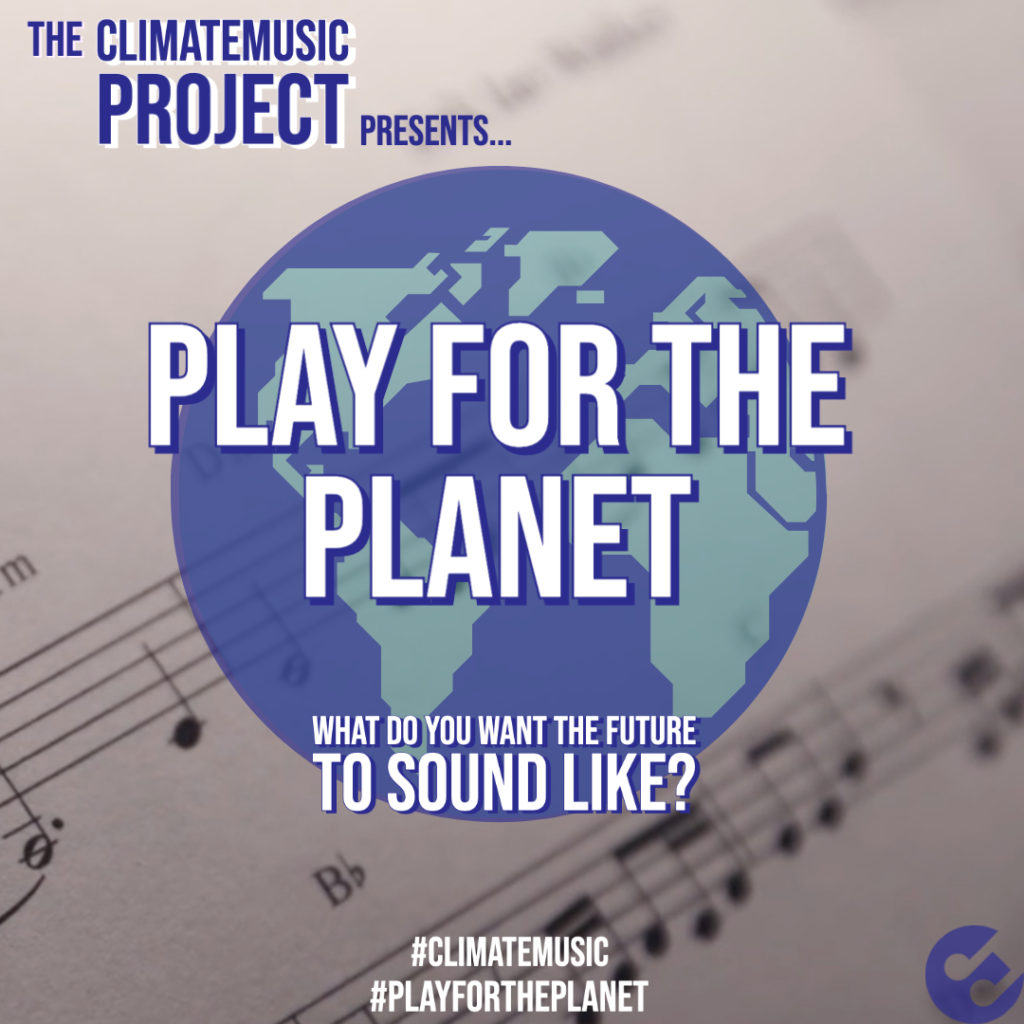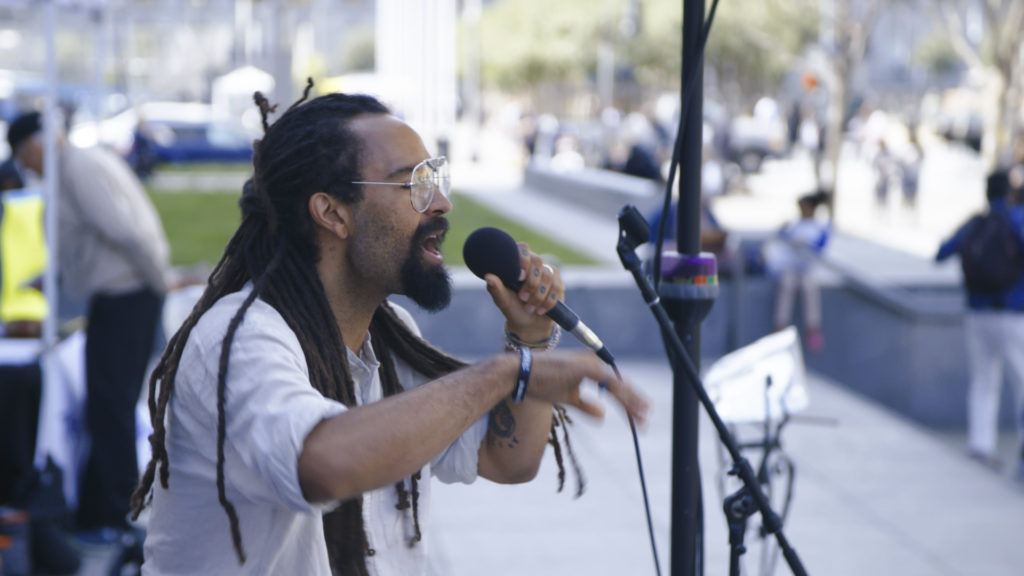What do you want the future to sound like?
https://youtu.be/oqWPOU3TnDg
We invite artists from around the world to join us and respond to the question:
“What do you want the future to sound like?”
The ClimateMusic Project is delighted to feature responses from the creative community in our virtual series, “Play for the Planet”, which is a diversion from our core science-guided music during this time of Covid. We also invite artists to call out their favorite environmental nonprofits or highlight our own amazing partners in order to motivate action and engagement. At a time when the future of our climate seems dire, the need for hope and action has never been more important.
Interested in joining us and being featured on our website and social media? Send us a message at inquiries@climatemusic.org
Facebook
Twitter
Youtube
Instagram

The ClimateMusic Project is proud to be an official event of US Climate Action Week. During the week of April 19-23, we will be posting videos and testimonials of artists who are using their platforms to communicate about climate change.
Be sure to check out this page during the week of Earth Day to hear some stunning new performances from artists sharing what they want the future to sound like!
The Wyatt Act is San Francisco’s own SlamRock band! In addition to producing and performing original music for livestreams, themed shows, and social justice causes, The Wyatt Act promotes togetherness through music and comedy with the original genre and movement – SlamRock.
SlamRock is street-corner style poetry meets transgressive rock. It is a philosophy, a lifestyle, an attitude, a swagger, and a reaction to a society of detached, automatic, alienated, civilized play-acts. SlamRock values process over product and interaction over isolation.
Learn more about They Wyatt Act here.
Why communicate about climate change through music?
“Music is everything – the vibration of all moving molecules, the energy of existence,” says The Wyatt Act. “It’s important to find creative ways to communicate the issues surrounding climate change in the same way that it’s important for the Fire Department to coordinate a response to a raging fire while limmed in flames – the climate crisis is the most threatening emergency of our time.”
The Wyatt Act supports the work of Amazon Frontlines, an organization with a mission to defend indigenous rights to land, life, and cultural survival in the Amazon rainforest. Join the Wyatt Act in supporting their work here.
Luca Solbiati is a songwriter who played as frontman of Zeropositivo and theFilmakers in Italy and Holland many years ago. During lockdown, he finally worked again on the music project he had kept in the drawer for 10 years – “God Bless Nature, Art & Music.”
Learn more about Luca Solbiati here.
Why communicate about climate change through music?
Luca Solbiati believes that “music and art have always been a powerful tool for transmitting messages to awaken people’s souls and to create empathy.”
Luca Solbiati supports the work of the National Geographic Society, one of the largest non-profit scientific and educational organizations in the world. The National Geographic Society sponsors scientific research with a commitment to exploring and protecting our planet. Join Luca Solbiati in supporting their work here.
With music, Michele Walther can express her love, gratitude and wonder for Mother Earth, for our planet, for life itself; music is the language of her soul. Besides performing in many bands and many countries (USA, Europe, Mexico), Michele is a member of the Climate Ensemble, and she also wrote the soundtrack for “Not Without Us”, a documentary about the 21st U.N. Climate Conference in Paris.
Learn more about Michele Walther here.
Why communicate about climate change through music?
“Music speaks to the heart and the whole being, while scientific facts speak mainly to our cognitive brain,” says Michele Walther. “Climate change affects all of humanity. Awareness and truth don’t reside in the cognitive brain alone, but in our whole being, body and mind — therefore music and arts are an essential way of communicating the urgency of climate change.”
Michele Walther supports the work of Fridays for Future, an organization that began with Great Thunberg when she and other young activists protested in front of the Swedish Parliament in August 2018. It has now grown to a global youth-led movement to fight the climate crisis. Join Michele Walther in supporting their work here.
Asuka Elias is a clarinetist based in NYC. Although she’s been performing for a while, she’s always wanted to find ways to solve the climate crisis. She would be grateful if she could be even a small part of the movement to combat climate crisis through music.
Her idea of music is always to show the idea of transformation: from the darkest to the brightest. It is about negativities turning towards positivities, and she believes it is what we need in order to save the Earth from climate crisis. She hopes that she can express these ideas through the sound.
Learn more about Asuka Elias here.
Why communicate about climate change through music?
“Music is a tool to connect with people. It is the universal language, and I believe music can be the core source to motivate people to take actions against climate change,” says Asuka Elias. “While we can learn the facts and knowledge from climate data, we can experience through your mind and feeling with music.”
Asuka Elias supports the work of non-profits One Tree Planted and Charity Water. One Tree Planted focuses on global reforestation, and Charity Water works to bring clean and safe drinking water to people in developing countries. Join the Asuka Elias in supporting their work here: One Tree Planted, Charity Water.
Yury Revich is a violinist and composer based in Vienna who works to raise awareness and inspire people around the world to unite in helping and celebrating our planet. He wants to make sure we preserve it safe and healthy for the future generations.
Learn more about Yury Revich here.
Why communicate about climate change through music?
“Music is the universal language which helps people consciously and unconsciously feel different kinds of emotions, it can change their approach to life, it can help them to understand who they truly are,” says Yury Revich. “Music can help people understand certain issues, when they are not receptive or don’t want to hear the issues through the words or preaching.”
Yury Revich supports the work of Climate Nights, an organization that uses nightlife performances, such as music, to inspire climate action. Join Yury Revich in supporting their work here.
Pascale Montgomery is a current freshman at UC Berkeley majoring in Society and the Environment with the intention to minor in Music. She has released two independent songwriting projects under the name “Pascale Cheron”.
During her senior year of high school, Pascale sold copies of her album “Walking through Cobwebs” to fundraise for people in her community that had lost their homes due to the river fire that burned through Carmel Valley and Salinas. When she’s not attending classes, Pascale is interning at the Berkeley Basic Needs Center, rehearsing with Cal Jazz Choir, and organizing an album project as a part of the Songwriters at Berkeley!
Learn more about Pascale Montgomery here.
Why communicate about climate change through music?
“To me, music is presence. It pushes me to listen, engage, and reflect critically as an activist and as a person,” says Pascale. “Music defies barriers, and it creates space for crucial conversations that defy the structure and linear syntax of conventional discourse. Music is community, friendship, and hope.”
Pascale Montgomery supports the work of The Sogorea Te’ Land Trust, an urban Indigenous women-led land trust that facilitates the return of Indigenous land to Indigenous peoples. Join Pascale in supporting their work here.
Larry Ebert is a San Francisco based pianist, singer, and entertainer whose work is about expression and connection— with self, with others, and with nature.
Learn more about Larry Ebert here.
Why communicate about climate change through music?
“It is vital to find creative ways to communicate the issues surrounding climate change because we need to take action to restore our planet, our environment and atmosphere, and this begins with awareness, attention and caring,” says Larry Ebert. “We may need to feel our way into this, together. When we tap creative expression, we open up new channels to see and receive in a new way.”
Larry Ebert supports the work of the Environmental Defense Fund. EDF fights to raise money and protect the environment through science, economics, and advocacy. Join Larry Ebert in supporting their work here.
About Garret Boudinot and Meesa
Garrett is a researcher at Cornell studying how different agricultural practices can draw down atmospheric carbon and store it in soils. His work is directly related to climate change, and particularly how we can solve climate change using new techniques and technologies.
Meesa is currently an IT professional. They use systems level thinking and design to create efficient and effective processes that ultimately make online education more accessible. Their passion lies in the food system, and similarly, increasing effectiveness of systems to decrease waste and increase valuation for sustainably produced foods.
Why communicate about climate change through music?
Garrett: “Music for both of us has always been a collaboration – a conversation within a community that leads to some positive outcome – a process of creating, refining, improvising, both within musicians and between musicians and the audience. I’ve never been good at communicating my emotions verbally, but can do that through music. So while I can write scientific papers on climate change for my job, it’s harder for me to get across the emotive aspect of why I do climate change work, and particularly, where I want to be headed with respect to climate change in a bigger picture – music and the arts provide a way to get across that non-technical aspect of our responses to climate change that, in many ways, are stronger motivators than any statistic or metric or projection.”
Meesa: “As a bit of a parallel, in terms of emotional expression I am an empath. I am emotionally driven, and often find myself at a loss for words. This is one of the reasons why my friendship with Garrett is so strong. I feel that for both of us, music is a way that we can truly express the root of what we are feeling, in a way that we may not have been able to communicate verbally. Often after we play together, I feel like it creates space for us to have more meaningful connection. I hope this can inspire folks to try something similar, to get creative with their communities, and open up space to really drive conversations that people may feel divided on, namely our current climate crisis.”
Garrett Boudinot and Meesa support the work of the Left Hand Watershed Center, The Nature Conservancy, and Backcountry Hunters and Anglers. The Left Hand Watershed Center uses a science-based approach to conserve watersheds for people and the environment in Meesa’s local Lefthand Canyon. The Nature Conservancy pursues direct conservation through easements, policies, and organizing. Backcountry Hunters and Anglers works on organizing and pushing the policy world toward sound conversation.
Join Garrett and Meesa in supporting their work here: Left Hand Watershed Center, The Nature Conservancy, Backcountry Hunters and Anglers.
View the Play for the Planet Recap video from our Fall 2020 campaign below:
https://www.youtube.com/watch?v=jZBByMBTJBg
Join Us!
Interested in joining us and being featured on our social media and website? Send us a message at inquiries@climatemusic.org! Or make your own video, post it, and use the hastags: #PlayforthePlanet and #ClimateMusic, #USClimateActionWeek, and tag us @theclimatemusicproject on Instagram and @ClimateMusic on Twitter.
Be sure to follow our social media as we continue to post new videos of artists playing for the planet!

About Play for the Planet 2018
In Spring of 2018, we put on a live Play for the Planet as an official affiliate event of the Global Climate Action Summit. We set up on the steps of San Francisco’s main public library, and invited artists to perform their own music and art based on the question: What Do You Want the Future to Sound Like?
The result? — a full day of stunning performances by singers, musicians, poets, and beatboxers, some prepared and some impromptu passer-bys, who came together to create an art-based response to the climate crisis, playing for a hopeful future. Watch videos from that day in May here.
